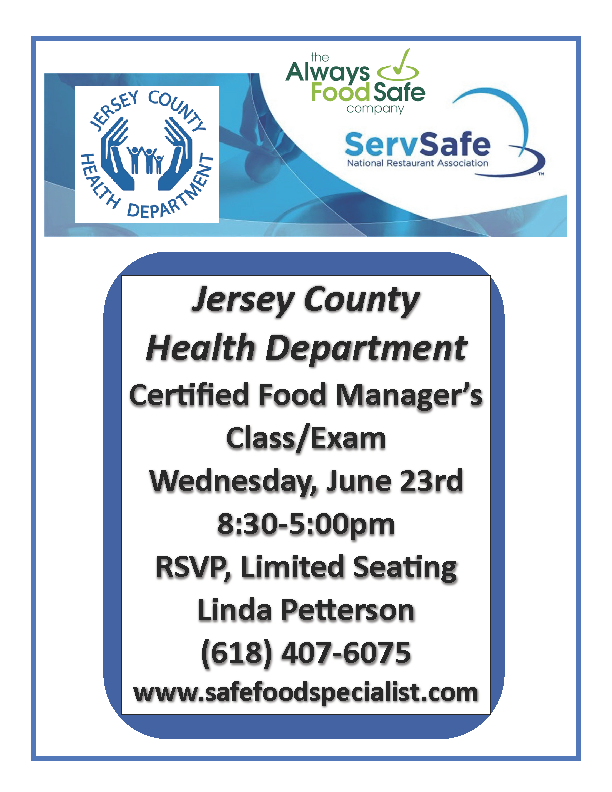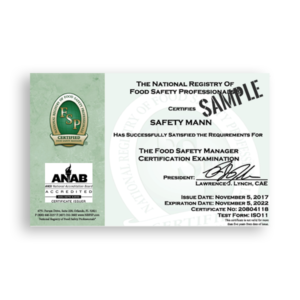Certified Food Manager Certification: What You Need to Know
Certified Food Manager Certification: What You Need to Know
Blog Article
Certified Food Manager: The Trick to Safe and Compliant Workflow
The duty of a Certified Food Supervisor (CFM) is significantly recognized as vital in keeping certified and risk-free procedures within the food solution industry. Comprehending the complete extent of their contributions raises inquiries about the more comprehensive ramifications for companies and consumer trust fund in food safety techniques.
Role of a Licensed Food Manager
The function of a Licensed Food Manager is crucial in making sure food security and conformity within food solution establishments. These professionals are accountable for looking after all facets of food preparation, handling, and storage, ensuring that facilities abide by wellness laws and sector requirements. Their training furnishes them with the knowledge to acknowledge potential hazards, implement correct food security methods, and maintain sanitation methods.
Licensed Food Managers play an essential duty in training and overseeing kitchen area staff, instilling a society of security and compliance throughout the establishment. They perform routine evaluations to recognize locations that need renovation and ensure that rehabilitative activities are applied swiftly - Food Manager Certification. Additionally, they are tasked with developing and enforcing standard procedure (SOPs) related to food safety and security, which offer as a guide for workers
Their competence extends to checking food temperature levels, preventing cross-contamination, and managing irritant controls, all of which are necessary to shielding public health and wellness. In Addition, Certified Food Managers are commonly the primary point of call during health and wellness inspections, representing their facilities and addressing any type of conformity issues increased by health and wellness authorities. Inevitably, their commitment to food safety is essential for keeping customer trust and protecting the track record of food solution organizations.
Importance of Food Security
Food security is continually a leading concern in the food solution industry, as it straight affects public health and wellness and consumer confidence. Ensuring that food is dealt with, prepared, and kept safely assists to avoid foodborne health problems, which can lead to severe health complications and even casualties. The economic repercussions of foodborne outbreaks can be staggering, resulting in pricey recalls, legal actions, and significant damages to an organization's reputation.
In addition, food safety practices cultivate a society of responsibility and professionalism and reliability within food establishments. When employees are trained in correct food managing methods, they are more probable to adhere to safety and security protocols, which minimizes the threat of contamination. This not just safeguards customers however additionally enhances functional performance and compliance with neighborhood health and wellness guidelines.
Consumer awareness pertaining to food security has raised considerably, bring about heightened assumptions for transparency and top quality in food service. Facilities that focus on food safety are extra likely to gain client trust fund and loyalty, inevitably adding to their lasting success. Spending in robust food security measures is not just a governing obligation; it is an essential organization technique that profits both consumers and food service drivers alike.
Training and Qualification Process
Comprehending the training and certification process for food managers is crucial for preserving high criteria of food safety and security within any type of establishment. The procedure commonly begins with extensive training programs that cover crucial subjects such as foodborne health problems, appropriate food handling methods, and cleanliness techniques. Food Manager Certification. These programs can be supplied via numerous layouts, consisting of online courses, in-person classes, or workshops, and are made to furnish food managers with the expertise needed to avoid food security threats
Upon conclusion of the training, prospects have to pass a certification test, which assesses their understanding of food security principles and policies. The exam is typically provided by certified organizations, guaranteeing that the certification is recognized and respected within the industry.
As soon as licensed, food supervisors are needed to stay existing with recurring education and learning and training to preserve their credentials. This might include attending correspondence course or getting involved in workshops that attend to new food security methods and policies. Overall, a durable training and accreditation process not just boosts the skills of food managers yet likewise adds to the total safety and security and conformity of food operations in any kind of establishment.
Conformity With Rules
Conformity with laws is a critical aspect of a food supervisor's duties, as it makes sure that facilities comply with local, state, and government food security criteria. These laws are developed to alleviate threats connected with foodborne ailments and advertise secure food managing practices. A qualified food manager (CFM) plays a pivotal role in analyzing and executing these requirements within their operations.

CFMs must additionally execute and establish tracking systems to routinely evaluate conformity with food safety and security practices. This might involve regular inspections, document keeping, and training sessions for staff to enhance safe food handling methods (ServSafe Food Manager Certification). Moreover, in case of a regulatory evaluation, a CFM's readiness can significantly influence the end result, as they learn the facts here now will certainly be responsible for showing adherence to all relevant guidelines. Ultimately, efficient compliance administration cultivates a culture of safety and security and responsibility within food solution operations.

Benefits of Hiring CFMs
Employing certified food managers (CFMs) supplies significant advantages for food solution establishments looking for to improve their operational efficiency and security requirements. CFMs have specialized understanding of food safety and security laws, hygiene methods, and threat administration, ensuring conformity with federal and regional legislations. This competence assists reduce the likelihood of infractions that can cause temporary closures or costly penalties.
Moreover, CFMs play a critical role in training team, promoting a culture of food safety and security within the establishment. They implement standardized treatments, screen food dealing with methods, and pop over to these guys carry out routine audits, considerably lowering the risk of foodborne ailments. This not only safeguards clients but also enhances the navigate to these guys facility's online reputation.
Furthermore, hiring CFMs can cause improved functional performance. Their training makes it possible for team to work extra properly, reducing waste and making the most of performance. Facilities with certified food supervisors frequently experience greater customer satisfaction, as trained staff members are better geared up to guarantee high quality service and food safety and security.

Ultimately, purchasing a licensed food supervisor is a financial investment in the lasting success and sustainability of a food solution operation, creating a more secure environment for both clients and workers.
Conclusion
To conclude, the duty of a Licensed Food Manager is vital in preserving certified and secure food solution procedures. Via reliable oversight of food taking care of practices, continuous team training, and adherence to regulatory standards, CFMs play a critical duty in mitigating foodborne health problem risks. The financial investment in certified management not only boosts functional performance however also promotes a culture of liability, ultimately benefiting both the establishment and its clients while advertising public health and wellness and security.
The function of a Licensed Food Supervisor is important in making sure food security and compliance within food solution establishments.Comprehending the training and accreditation procedure for food managers is crucial for maintaining high criteria of food safety within any type of establishment. On the whole, a durable training and qualification procedure not just improves the skills of food managers however additionally adds to the general security and conformity of food operations in any type of facility.
Hiring qualified food managers (CFMs) provides significant benefits for food service facilities looking for to enhance their functional performance and security criteria. Establishments with licensed food managers often experience greater client contentment, as trained workers are better geared up to ensure quality service and food security.
Report this page